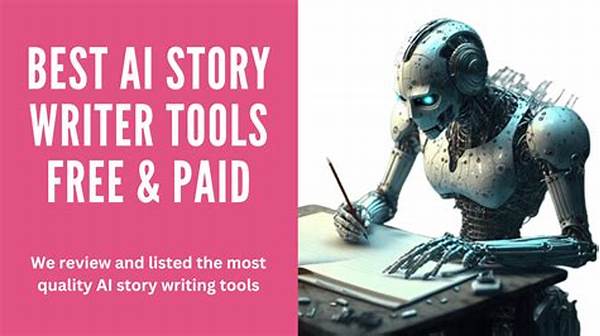In the ever-evolving world of literary creation, the integration of artificial intelligence presents an unprecedented opportunity. Today’s best AI tools for writers and storytellers promise to revolutionize how narratives are crafted, enabling creativity beyond traditional human constraints. Whether you’re a seasoned novelist, a budding blogger, or a marketing professional seeking to weave captivating tales, AI is here to enhance your storytelling capabilities. By automating mundane tasks, providing creative prompts, and even suggesting plot twists, these tools free up invaluable mental real estate, allowing writers to focus on the artistic aspects of their craft. Welcome to a new era of narrative innovation, where artificial intelligence is not just a tool but a trusted companion in the storytelling journey.
Read More : Top Ai Tools For Motion Graphics In 2025
Imagine a world where writer’s block becomes a relic of the past. With the best AI tools for writers and storytellers, this vision is not just a fanciful dream but a tangible reality. These tools are designed with unique features that cater to a writer’s every need, offering suggestions for sentence structures, identifying grammatical errors, and even generating creative content ideas. As a result, writers can maintain their unique voice while receiving unparalleled support from cutting-edge technology.
AI tools have proven to be game-changers in plot development and character building. Through sophisticated algorithms, they analyze countless narratives and generate new, compelling storylines that captivate and engage readers. This not only saves time but also ensures a higher level of creativity and originality in your work. Writers, therefore, can invest more energy into the intricate nuances of storytelling, enhancing both the depth and the breadth of their narratives.
The most remarkable aspect of using the best AI tools for writers and storytellers is the accessibility they provide. Writers from all walks of life, regardless of their experience level, have access to advanced resources that were once deemed exclusive to acclaimed authors. This democratization of creativity is a monumental shift, empowering individuals to express themselves freely and explore their storytelling potential like never before.
How AI is Revolutionizing Storytelling
The introduction of AI in the literary domain has paved the way for incredible advancements in storytelling. These sophisticated tools offer writers a spectrum of possibilities, far beyond mere typographical correction or syntax checks. AI’s real charm lies in its ability to elevate a narrative by providing insights previously unavailable to writers.
In-depth analyses of past works, identifying trends, and predicting potential reader responses are part of the package with AI. Writers receive feedback based on data-driven insights, enabling them to fine-tune their narratives for maximum impact. It’s akin to having a dedicated editor by your side 24/7, offering nuanced guidance, and always ready to lend a hand.
Moreover, AI tools are adept at analyzing the emotional and psychological depth of characters. By providing suggestions for character arcs, personality traits, and dialogue options, these tools can help craft multidimensional characters that resonate with readers. Best of all, they interact with writers in real-time, offering a dynamic writing experience that bridges creativity with technology.
—
Descriptive Overview of AI Writing Tools
Navigating the landscape of AI-powered writing tools can seem daunting. However, understanding their unique benefits can clarify their importance. From enhancing productivity to fostering creativity, these tools are tailored to meet the diverse needs of contemporary writers.
Exploring the Benefits
One key benefit of the best AI tools for writers and storytellers is enhanced productivity. By automating repetitive writing tasks, such as rephrasing and editing, AI allows writers to focus more on creative aspects, leading to more original content. Additionally, AI tools can conduct thorough research on behalf of writers, collating data into coherent, user-friendly formats, thereby saving valuable time.
Types of AI Tools
There is a wide array of AI tools available, each catering to different facets of writing. For instance, some are designed to suggest creative prompts, while others specialize in structural editing or enhancing language proficiency. These tools also provide analytics regarding reader engagement, empowering writers with the information necessary to tailor their content effectively.
The AI tools operate on advanced algorithms that mimic human thinking to offer creative solutions. This technology helps writers explore new genres and styles they might not have considered before, encouraging innovation in their narrative expressions.
In contemporary journalism, narrative styles are evolving, and AI is at the forefront of this change. Tools equipped with machine learning capabilities analyze language trends and suggest modifications that align with current standards, ensuring that writers remain relevant in their field.
Lastly, the cost-effectiveness of AI tools is notable. Many platforms offer affordable subscriptions compared to hiring traditional editors or proofreaders, providing value for money while enhancing the quality of the written piece.
Highlights of the Best AI Tools for Writers
Many writers have lauded the transformative impact of AI tools, noting improvements in both the speed and quality of their work. For budding authors, in particular, these tools are invaluable in bridging the gap between amateur writing and professional publication.
Transitioning to AI solutions may require a learning curve, but the long-term benefits promise a rewarding investment. As technology progresses, these tools will only continue to enhance the art of storytelling, making them indispensable for anyone serious about writing.
The Future of Writing with AI
With the best AI tools for writers and storytellers, the future of writing looks promising and exciting. These tools not only support but indeed expand the horizons of what is possible in the realm of storytelling. As AI continues to evolve, its potential to assist writers will only grow more profound.
Innovations and Possibilities
Imagine integrating VR experiences with AI-driven narratives to create immersive storytelling environments. Such innovations could revolutionize educational curricula, making learning engaging and interactive. By offering personalized writing assistance and enhancing educational methodologies, AI is poised to balance the art of storytelling with the precision of technology.
Furthermore, AI could become an essential tool in preserving endangered languages. By compiling comprehensive databases of linguistic nuances, AI could help storytellers revive and perpetuate these rich cultural heritages through new narratives, thereby safeguarding them for future generations.
Moreover, AI tools could assist in creating narratives that adapt in real-time to audience feedback during performances or readings. This interactive dimension presents not only a marketing boon but a true evolution in audience engagement.
Indeed, the potential for AI-driven storytelling tools is vast and largely unexplored. Writers can look forward to a future where their creative endeavors are buoyed by the collaborative power of AI.
Navigating Ethical Considerations
While AI’s benefits are diverse, the ethical implications of its use in storytelling should not be overlooked. Ensuring AI transparency and addressing intellectual property concerns are critical. Writers and developers must collaborate to establish guidelines that maintain the integrity of the creative process.
As AI integrates further into writing practices, education on its ethical use will become paramount. By understanding both the capabilities and limitations of AI in storytelling, writers will be better equipped to make informed decisions about their use of this transformative technology.
In conclusion, writers and storytellers stand on the cusp of a revolutionary era. With AI as an ally, the possibilities for creative expression are virtually limitless. By embracing the best AI tools for writers and storytellers, the future becomes not just a blank page, but an open canvas for the most imaginative narratives yet to be told.
Tips for Maximizing AI Writing Tools
With AI standing as a pillar of modern writing, embracing it doesn’t mean losing your creativity. Instead, it offers an expansive toolkit to better express your unique storytelling voice. By fully leveraging these tools, writers not only enhance their narratives but also push the boundaries of what storytelling can achieve in this new digital age.


